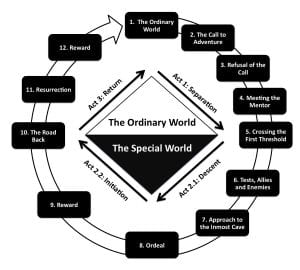“Is your course like a journey, a parable, a game, a museum, a romance, a concerto, an Aristotelian tragedy, an obstacle course, one or all or some of the above?”*
 The ‘student experience’ and the ‘student journey’ are at the forefront of contemporary Higher Education, which is much more seen as an individually transformational endeavour than the simple collection of knowledge it once was. In this context it has become more and more important to consider the role and agency of students as part of learning and teaching planning, rather than just focus on content that is to be mysteriously transmitted. We suggest that it is worth considering the framework provided by the hero’s journey, a model coming out of scriptwriting, as a guiding principle behind planning new and reflecting on old learning and teaching design. In so doing, educators can provide a fresh look at their courses and modules and truly put the individual student front and centre of their own learning journey, by casting them in the role of hero. The somewhat simple formula of the hero who encounters many obstacles on their journey, and returns to the ordinary world transformed, and often with some kind of magical boon, can easily be read as the student who encounters many obstacles and tests on their journey through university (but more specifically through subject knowledge/content/skills), and (hopefully) returns to the ordinary world (or the ‘real world’ outside of the realm of academia) transformed, with the ‘magical’ boon of subject knowledge and relevant skills to their chosen discipline.
The ‘student experience’ and the ‘student journey’ are at the forefront of contemporary Higher Education, which is much more seen as an individually transformational endeavour than the simple collection of knowledge it once was. In this context it has become more and more important to consider the role and agency of students as part of learning and teaching planning, rather than just focus on content that is to be mysteriously transmitted. We suggest that it is worth considering the framework provided by the hero’s journey, a model coming out of scriptwriting, as a guiding principle behind planning new and reflecting on old learning and teaching design. In so doing, educators can provide a fresh look at their courses and modules and truly put the individual student front and centre of their own learning journey, by casting them in the role of hero. The somewhat simple formula of the hero who encounters many obstacles on their journey, and returns to the ordinary world transformed, and often with some kind of magical boon, can easily be read as the student who encounters many obstacles and tests on their journey through university (but more specifically through subject knowledge/content/skills), and (hopefully) returns to the ordinary world (or the ‘real world’ outside of the realm of academia) transformed, with the ‘magical’ boon of subject knowledge and relevant skills to their chosen discipline.
*Bain, K. (2004) What the Best College Teachers Do. Cambridge: Harvard University Press, p.186.